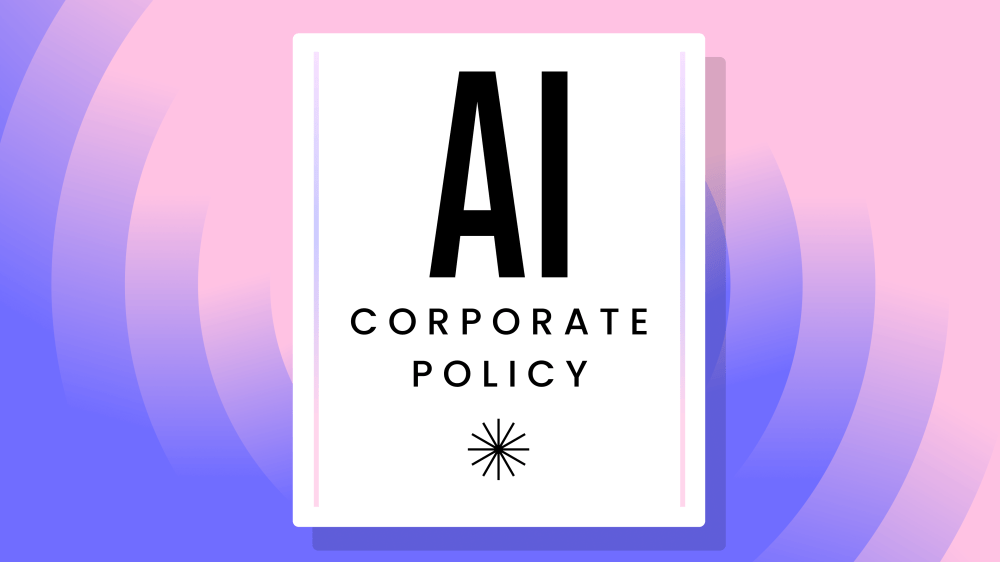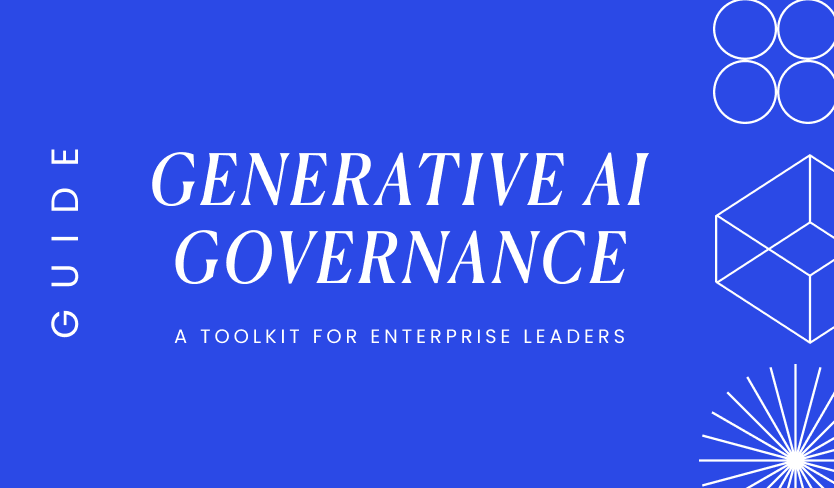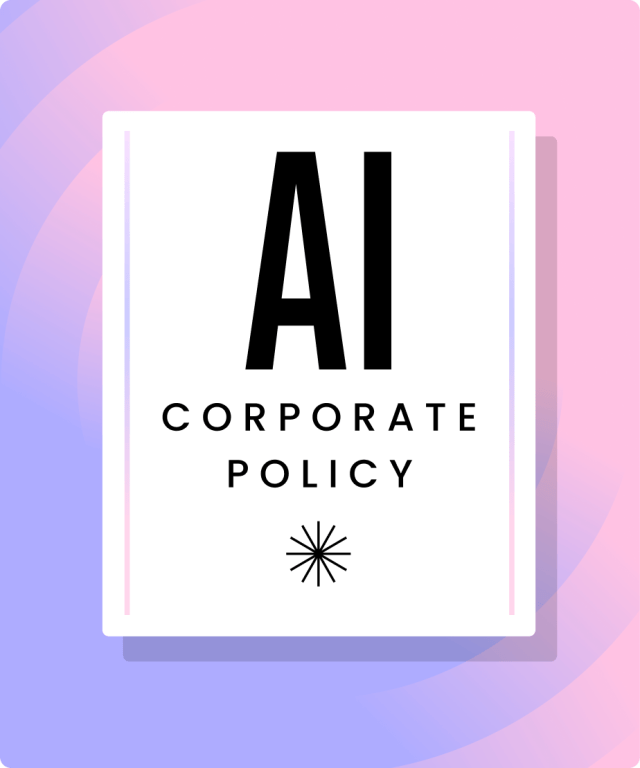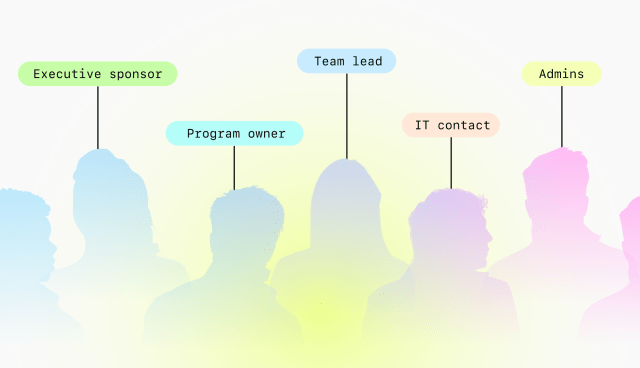Enterprise transformation
– 10 min read
Why every company needs a corporate AI policy
A guide to creating one

In the late 18th century, a pressing need arose as the Industrial Revolution picked up — policies to regulate working conditions and protect workers’ rights.
Fast forward to today. We’ve swapped typewriters for MacBooks and steam engines for artificial intelligence algorithms, yet we face a similar need. We need policies with rules and guidelines to make sure AI’s power is used ethically, responsibly, and for the benefit of all. That’s where a corporate AI policy comes into play.
According to the AICPA & CIMA Economic Outlook 2024 Q4 Survey, 30% of business executives experiment with generative AI in business applications. That’s up from 23% the previous year — good news, right? Well, 58% of business executives also report that their organization doesn’t have policies and protocols addressing data security and safe, responsible, and ethical AI usage.If your company is experimenting with AI, you need a corporate AI policy. We’ll explain corporate AI policies and why your company needs one. We’ll also walk you through the process of creating one, so your business isn’t just keeping up with the AI revolution but leading the charge responsibly.
- A corporate AI policy is a set of guidelines and regulations that ensures AI technologies’ ethical and responsible use.
- It helps follow applicable laws and regulatory standards, protect data privacy, and prevent data bias and discrimination.
- Steps to creating a solid corporate AI policy include assessing AI needs and goals, creating a governance framework, educating employees, monitoring AI performance, and instituting regular reviews and updates.
- A corporate AI policy is essential to join the ranks of forward-thinking organizations leading the AI revolution.
What is a corporate AI policy?
A corporate AI policy is a set of guidelines and regulations designed to promote AI technologies’ ethical, responsible, and secure use, reflecting a company’s core values and legal obligations. This policy serves as your roadmap for AI adoption, clearly identifying potential risks and pitfalls while setting up an ethical decision-making framework for you to address them head-on.
Why your company needs a corporate AI policy
The Industrial Revolution changed people’s perceptions of the goods and products they used in their daily lives. Companies could produce more goods, and consumers had more choices than ever before. AI is driving a similar proliferation, as companies use it to reimagine SEO workflows, offer patient-specific benefits recommendations, and more.
With any fundamental shift in the way we work, companies need to adapt and make sure their employees use AI securely and responsibly. Handling sensitive data and proprietary information responsibly is essential for compliance with data privacy laws and to maintain transparency and accountability. This is where a corporate AI policy comes in.
Compliance with legal and regulatory standards
If you’re using generative AI regularly — or suspect your employees might be — then you must stay within the legal boundaries. AI technologies are subject to various laws and regulations, including data privacy, intellectual property rights, and consumer protection. Without a corporate policy that addresses all relevant regulations, you may accidentally violate AI-specific legislation or subject your organization to security risks.
Data privacy protection
A corporate AI policy is essential for protecting sensitive and proprietary data from security breaches. By clearly outlining how data is collected, stored, and used, this policy ensures your customers and employees’ data privacy and security. Many companies are taking it further by partnering with AI providers that use synthetic data to train their models and have strong privacy policies — both great countermeasures to AI risks.
Prevention of data bias and discrimination
AI language models, like sponges, absorb the characteristics of their training data. If the data is biased, there’ll likely be bias in AI outputs too — which can lead to discriminatory outcomes based on race, gender, age, or other traits. A corporate AI policy enforces regular bias reviews and audits, putting their data under a magnifying glass to ensure AI-generated content is fair and unbiased. Opt for high-quality, diverse data so your organization can foster an equitable and inclusive environment.
Transparency with your employees
Deploying organization-wide AI without proper training, explanation, or policies can spark power struggles — between IT teams and other departments or executives and employees. To prevent these conflicts, it’s important to understand your people and culture before crafting a corporate AI policy. Chantal Forster, AI strategy resident for the Annenberg Foundation, suggests involving your entire company in the policy creation process. Her team found, for example, that there were varying definitions of inclusion and what it meant in the context of AI.

Generative AI governance: A toolkit for enterprise leaders
Read the guide
AI tool usage policy template: What we use at WRITER
To boost AI literacy and safety for everyone, we’ve developed the ultimate AI usage policy template. This document details the importance of using AI responsibly and serves as a guide for teams navigating the world of AI in various business use cases.
Check out this document to better understand why it’s crucial for businesses to incorporate an AI usage policy for their teams.

Download the template
5 steps for creating a solid corporate AI policy
Changes in working practices during the Industrial Revolution eventually led to companies introducing policies and restrictions around working hours, ages, and general labor conditions. AI is clearly having a significant impact on the way people and companies work. That’s why it’s important to get ahead and create a corporate AI policy now.
Step 1: Assess your organization’s AI needs and goals
Before embarking on any AI projects, it’s key to understand your organization’s needs, goals, and mission-critical workflows. This looks like finding repetitive tasks that could be automated, bottlenecks that could be smoothed out with predictive analysis, or large datasets that could benefit from machine learning to uncover insights. This step allows you to identify where AI can add value.
Whether you’re investing in a platform or building your own AI solution, evaluating different generative AI LLM vendors is essential. Look for a vendor that’s truly a partner and can support you in transforming your enterprise workflows through effective change management. This will ensure that your business and tech leaders are aligned, on board, trained, and ready to embrace change — helping you create a strong and effective corporate AI policy.
Step 2: Create a governance framework for AI
A governance framework for AI is a set of rules for how AI should be used and managed within an organization. This includes the day-to-day handling of AI and the broader strategy for its development, deployment, and maintenance.
In your governance framework, include detailed processes that outline how to use AI ethically and responsibly — with a strong focus on data privacy, security, and transparency. You should also include measures for preventing bias and ensuring compliance with all relevant regulations.
Here’s a list of questions to ask as you create your AI governance framework:
- What is the purpose of the AI policy?
- How will the AI policy be communicated to stakeholders?
- What are the ethical considerations for the use of AI?
- What are the legal considerations for the use of AI?
- What are the risks associated with the use of AI?
- How will the AI policy be monitored and enforced?
- What data privacy and security measures are required for using AI?
- How should AI-driven decisions be validated?
- What processes need to be in place for decision-making and accountability?
- Who’ll be responsible for implementing and enforcing the AI policy?
Check out the generative AI governance toolkit and get practical insights and actionable steps to implement effective governance for your generative AI program.
Step 3: Educate employees on AI policy
Educate and train employees on the policy, its guidelines, and how to adhere to it. Providing comprehensive knowledge about AI and its ethical implications can foster a culture of responsible AI use and dispel fears.
For example, you can provide online training sessions and workshops for employees on data privacy, security, and ethical use of AI. This can include case studies to show the results of responsible and irresponsible AI use, quizzes to assess the effectiveness of the training, and feedback forms for employees to ask questions and seek clarifications.
You can also implement upskilling and reskilling programs to equip your team with the necessary skills to use AI effectively and drive innovation. When you show your workforce you’re invested in them, it instills a culture of continuous learning and boosts morale.
Step 4: Monitor generative AI performance
Implement a process to regularly monitor generative AI performance and ensure it’s performing as intended — not inadvertently causing harm or generating undesirable results. Tracking metrics such as the accuracy and speed of content generated should be included. Also, establish AI guardrails to prevent biases and ensure ethical use. This will provide valuable insights into the system’s performance and ability to produce high-quality content quickly.
For example, you can track the accuracy of content generated by monitoring the percentage of false negatives or positives generated. That’s one thing the SentinelOne team looked at when comparing AI tools before they found WRITER.
You can also track the system’s fairness by looking for any biases in the output, or evaluate its accuracy by comparing generated results with ground-truth data.
Step 5: Institute regular review and updates
Given the rapid pace of AI evolution, it’s important to regularly review and update your corporate AI policy. You should monitor changes in technology, regulations, and societal norms, and update your policy accordingly. Incorporating feedback from employees and customers into your policy is also important.
For example, if new privacy regulations come into effect, you’ll need to update your policy to guarantee compliance. If a groundbreaking AI development could change how your company operates, your policy might need to be adjusted to reflect this. Or, if employees express concern over a particular AI application’s impact on their work, their feedback should be considered during policy updates.
You can stay updated with guidelines for ethical AI development through the Office of Science and Technology Policy.
AI usage policy example
Take a look at what a fictional retail and consumer goods company might include as part of their AI usage policy.
To break down silos for quick access to existing insights and research, automate the creation of detailed discovery documents for defect resolution, and analyze customer feedback to inform new product development.
To analyze customer feedback and competitor data, collate and tag competing stores’ products, detect early signs of new product lines, and respond to market trends.
To create and update standard operating procedures, simulate customer service scenarios for training, and power an in-store associate knowledge assistant to answer customer questions.
To generate and optimize product descriptions, create unique campaign assets and test variants, and translate and transcreate marketing content for different markets.
To provide customer support agents with a knowledge assistant to answer questions, and to create and maintain knowledge or help articles.
Be at the forefront of the AI revolution
The Industrial Revolution changed how we lived and worked forever, and those without the foresight to adapt were left behind. Today, we stand on the brink of a similar seismic shift. AI isn’t just another piece of technology — it’s a new way of thinking and doing business.
Your corporate AI policy will guide your company through the opportunities and challenges that lie ahead. It’s your ticket to joining the ranks of forward-thinking organizations who aren’t just keeping up with the AI revolution but leading it.
Ready to transform your enterprise workflows and develop a strong AI policy? Partner with WRITER to drive change management throughout your entire organization, so you stay at the forefront of AI innovation.




